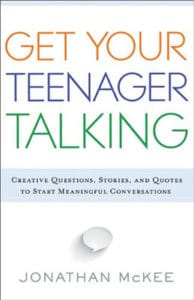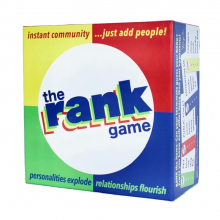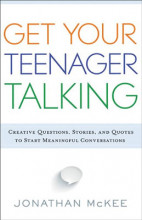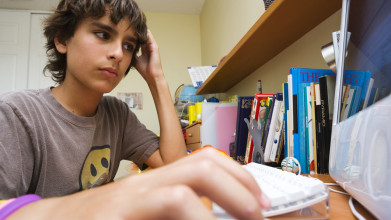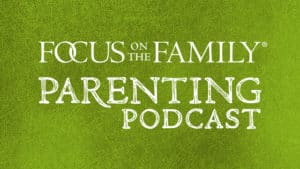Excerpt:
Jonathan McKee: During these times, this is a time where we could sit down and plop on the floor and be like, “Oh, man, you know, we’re week three into this. Okay. Here we go. You know, what’s the best thing about this that’s happened in the last three weeks? You know, what’s the worst thing?”
End of Excerpt
John Fuller: That’s Jonathan McKee and he’s our guest today on Focus on the Family with Jim Daly. Thanks for joining us. I’m John Fuller.
Jim Daly: Well, life has taken a crazy turn, hasn’t it, John? I don’t know if it’s crazy or disruptive. What’s the better term? But with this coronavirus situation everyone, most people, are staying at home more often and your kids are likely learning via computer as well through that distance learning approach. So now they’ve been mandatorily given the assignment to watch screens and to be on screens. Here at Focus on the Family we’ve often talked about how to engage your kids and draw them out from behind those screens. We’re going to continue to talk about that today. But with this new dynamic, we want to help you as a parent strike a good balance for your children between e-learning, digital entertainment, outdoor activity and some face-to-face engagement. So, there’s our goal to achieve today with our great guest, Jonathan McKee, who’s been with us before.
John: Yeah, and he’s up to the task. Jonathan is a great resource for – for this. He’s been with us a number of times. He’s a regular voice on our Plugged-In podcast. And we’re so glad that he’s part of the Plugged-In team doing the radio features in the podcast. He has launched three kids into the adult world. And with over 20 years of youth ministry experience, Jonathan has spoken across the country about screens and teens and social media. He’s written a number of books. And the one we’re gonna point to today that we have at focusonthefamily.com/broadcast is called Get Your Teenager Talking: Everything You Need to Spark Meaningful Conversations.
Jim: Jonathan, welcome back to Focus on the Family.
Jonathan: Oh, man, thanks for having me. Always good to be here.
Jim: Hey Jonathan, you’re our go-to expert on teens and their screens. So, tell us – we’re going to you. (Laughter) What was going on in the world of teens and screens before this coronavirus hit and what’s happening now?
Jonathan: Wow, no, that’s a – that’s a great question, because before all this was happening, the world was already in slightly panic mode simply because screens were kind of becoming a little bit out of control. So we started here a lot of conversation about screen time and, uh, the hours spent on, you know, scrolling through our Instagram feed or whatever that is and how much it’s affecting young people, because as they’re sitting there trying to measure up, you know. “How many people like my post?” This kind of stuff. So, as this is all happening and as our country is kind of almost taking this like step back of, “Hey, maybe we should, you know, not just let kids have screens in their bedroom all night and all this. Maybe we should – we should, you know, just pull back the reins a little bit.” All of a sudden, social distancing.
(Laughter)
Jim: Right.
Jonathan: Now, all of a sudden, it’s like, “Hey, the only way we can have any socialization is through screens.” So, it’s been tough for a lot of families to kind of figure this all out.
Jim: Well, yeah. And in addition to that, of course, it’s the you know, the e-mail from school saying, “Hey, we’re moving to online school. So, we want your kids 2 hours a day, going to their computer.” (Laughter) You know, what? Whoa. But let me – let me as a parent of two teen boys – again, our 19 year old, he was kind of bouncing between his campus apartment and home and I’m like, “Hey, choose one. I don’t want you coming back and forth.” You know, Jean and I are going…
Jonathan: (Laughing) Yeah, don’t spread the love here.
Jim: Yeah. No kidding. I was saying, “Just pick one.” So, he kindly chose to be home with us.
Jonathan: Cool.
Jim: So, he’s been with us the last three or four weeks which has been great. But the, uh, kind of the pillow talk for Jean and I as we lay down (laughter), it’s like, “The boys are spending too much time playing Madden football” or whatever they’re doing. And she’s – she’s probably more concerned. But, you know, I’ve got to hear her out. Speak to the couples that are having that kind of pillow talk every night now going, “The kids are just spending way too much time on the screens.” What’s some of the data to reinforce that concern?
Jonathan: Yeah, well, you know, it’s – it’s tough because we are in unprecedented times. And the facts are that, you know – that kids were spending a lot of screen time and again, not all screen time is created equal.
Jim: Right.
Jonathan: You know, sometimes parents used to be worried because they’re like, “Hey, my kids are spending a lot of time on screens.” But there’s a lot of good stuff you can do on screens. There’s a lot of good socialization that can happen on screens. The worry for a lot of the experts out there was when you’re seeing too much of this unhealthy screen time. And when I say unhealthy screen time, I think social media is one of those concerns that most experts kind of agreed on, especially, you know, if you’ve got a kid at all hours of the night and especially kids who are bringing their phones into the bedroom – and right now, 79% of young people bring their phone in their bedroom every night. We’re talking teenagers here.
Jim: Wow.
Jonathan: And even though most experts are saying, “Hey, you know what? That’s one spot screens should not be.”
Jim: Right.
Jonathan: So, picture this. If you know – if you’re teenage son or daughter is kind of scrolling through that Instagram feed or on TikTok forever going next, next, next. They’re just saying that a lot of the feelings they’re having is like, “How come I don’t look this good? How come I’m not measuring up? How come I don’t have this many likes?” You know, so that’s kind of some of those things we should be aware of. But, you know, again, during this time, these screens could be the only socialization they have. So, we shouldn’t be so quick to just say, “OK, here’s the amount of screen times per day, two hours” or whatever. Especially in a world that before all this started, young people already average nine hours and forty nine minutes a day of entertainment media of which over seven hours of that screen time. So, to all of sudden say, “Now, let’s cut that down.” That’s scary.
Jim: Yeah. When I look at that, it’s hard for me to believe that that’s actually true. But it is, right?
Jonathan: Yeah. Yeah.
Jim: I mean, these are researchers that have done this work. You know, one thing I would suggest to parents and Jean and I’ve done this is have them keep their phones in the kitchen or in your bedroom to recharge. And that’s the rule at night. We’ve done that the whole way through. The difficulty we have right now, of course, is we have an adult, a 19-year-old, and then Troy. So, Trent’s got a little more slack and Troy’s going, “How come you’re treating us differently?” What do you say to that?
Jonathan: When you got those boomerang kids, the kids that you send out and then they come back that’s even tougher because they’ve been the adult. They’ve been making some of these decisions. They’re deciding, you know, what they’re looking at on their screens and for exactly how long. So – so, yeah. No, that’s where we as families – I think one the best things we really need to do is actually sit down and talk about this stuff.
Jim: Yeah.
Jonathan: I mean, this is one of those things where I’m telling families, “Hey, you know what? If you haven’t talked about this, do that. Sit down.” And I would say, “Have a family meeting, but don’t call it that.” Because if you say, “We’re gonna have a family meeting.” You know, kids are going to be like, “About what? Wait. Why do we need a meeting?” You know? So, I always say, “Call a family meeting, but don’t call it that.” But the reason I – I encourage parents to actually think about calling the family meeting is because the focus of this should be making our kids feel noticed and heard, because so often we’re just going through the house doing triage and we’re just run around going, “Hey, how much screen time have you been on? Hey, turn that off.” And we’re kind of putting out little fires instead of talking about it. And the family meeting is that opportunity where we have an opportunity to sit down and basically say, “Hey, guys, lets – lets – I want to hear what you guys think. I mean, we’re entering some unprecedented times here in the next few weeks. And I kind of want your honest opinion about your expectations.” And the cool thing is, if we give them each a chance to dialog, we can get them an opportunity to verbalize maybe what they expect and ask and say, “Hey, what do you think your days should look like next…? I mean, tell us from – from wake up to go to bed. What do you think? I mean, you don’t go to school. So, I mean, that’s eight hours that’s different now. What do you think that should look like?”
Jim: That’s good. So, the first two we get the talking about the, uh, talk about the elephant in the room. Then we have call the family meeting if we’ve got issues. Just don’t call it the family meeting.
Jonathan: Yeah.
Jim: I also want to mention before we go to “pick one night” – you could describe for us what that is. But this idea of chores – this is so funny again last night. So, we’d been watching the Lord of the Rings director cuts. If you haven’t done it, they’re like four hours long. (Laughter)
Jonathan: Exactly.
Jim: It really takes up a lot of, you know, time for you. But we had popcorn. And Jean woke up the next day. We all put our dishes in the dishwasher. We didn’t run it. And the next day we’re looking down and there’s all these popcorn’s seeds in the bottom of the dishwasher. So, Jean’s going, “Okay, who put all the seeds in the dishwasher?” And of course, neither me nor Trent nor Troy raised our hands…
Jonathan: (Laughter).
Jim: …Because we couldn’t remember number one. But this idea of chipping in.
Jonathan: Yeah.
Jim: So how much expectations should parents have that, you know, clean up around the house is everybody’s job? Because so many people are in the house right now. They’re not normally there. They’re off to school. They’re doing their daily routines. But now we’re all there. We’re all eating. We’re all thrown wrappers away and cereal boxes and milk cartons.
Jonathan: Yeah.
Jim: And the load is almost like a army – you know, army level requirement. So, what do we do?
Jonathan: Absolutely. Well, one of the things I like to do, is, you know – our kids are usually coming up and saying, you know, “Hey, I’m responsible. You know, I’m an adult.”
Jim: (Laughter).
Jonathan: And if they start kind of claiming some of that stuff say, “Well, hey, you know what? If you want real world trust, how about some real world responsibilities.” You know? “And here’s an opportunity for you to learn what it’s like to have some of these real-world responsibilities.” And so, again, at that family meeting that you didn’t call a family meeting, talk about, “Hey, I’ll tell you what. You know what? What if each of us take a night where we’re responsible for dinner.” “Pick one night” is what I call it, you know, pick a night. OK, uh, you know, for you, you’re like, “Trent. Tuesday. Boom. It’s Trent Tuesday. You know? It’s Trent Tuesday, taco night.” You know and whatever. And he literally can – like, “Okay, here’s the list of what we’re going to buy. You know, here’s what we’re gonna do.” And he can make it. He can, you know – and then as a family, you help clean up because it’s – it’s no good one guy having to clean up, one girl having to clean up. But I think it’s kind of cool to – to divide up some of these responsibilities. And, uh, you know, it could be something as simple as saying, “Hey, which night do you want to own on that?” And that kind of leads us to some other options we can do, because my fourth idea is literally “owning up.” It’s what I call “own up” on some of these chores and projects. And that’s kind of basically thinking beyond the normal daily stuff and saying we’ve got all kinds of time now. You’re home eight hours a day more.
Jim: (Laughter).
Jonathan: Here’s some projects that need to be done. Let’s – let’s clean out the garage. And it doesn’t have to be the boring, terrible stuff that our kids don’t want to do. Maybe even ask them, “Hey, is there any fun things that we want to do that need to be done around here? Like what if we took our back patio and we strung some lights and we made it cool hangout place, you know? Is that a project one of you guys wants?” In other words, find something that you could kind of own and say, “Okay, let’s, you know – part of being an adult is real world responsibilities and what is something – who’s gonna be in charge of this during this time?” And parents can be honest. They could say, “I’d really like your help.”
John: Yeah. Well, again, our guest today on Focus on the Family is Jonathan McKee, and he’s a go-to for us with regard to teens and screens and media choices. He’s part of our Plugged-In team. And Jonathan has written a book called Get Your Teenager Talking. It’s got a lot of great resources in it. And we’d encourage you to stop by our website to get a copy or call us if we can be of help. Our number is 800, the letter A and the word FAMILY. Online we’re at focusonthefamily.com/broadcast.
Jim: So, Jonathan, we added that “pick one night” for one of the kids to do the dinner. Everybody clean up as a family. You mention number four of the seven “own up” to your shortcomings. I love that. That’s kind of a – regardless of the coronavirus that’s a good one to teach your kids. And then I love number five. “Help, Ruth.” Now I think I get that. But who’s Ruth and how can we help her?
Jonathan: Yeah. You know, that was one where basically I was telling parents about the opportunity to serve in the community and for my kids. We had a neighbor named Ruth and she was this amazing lady lives across the street. In her 80s. Her husband had just recently passed away and Ruth couldn’t do a lot. And – and she needed a lot of – you know, she needed help with things. And we got to meet her because my kids actually mowed lawns. And so, they started mowing her lawn, but they start saying, “Hey, you know what, she needs help with this.” And they realized that she needed more than just mowing lawns. And so, whenever we had an opportunity, man, we were always just trying to see what we could do to – sometimes just going over and visiting and talking with her. And, uh, I’ll tell ya, it’s been interesting seeing people kind of rise up during this whole Covid-19 thing, because we’re seeing a lot of neighbors who are saying, “Hey, do you need help? Is it hard for you to get out of the house? Guess what? I got one of these masks. I go grocery shopping all the time. While I’m grocery shopping, let me pick up some groceries for you.” And how cool if we kind of asked our families, “Hey, guys, what can we do to help some people in our neighborhood?” And this is, again, another one of those opportunities where we can just listen and see what our kids come up with. And they might come up with ideas we hadn’t even thought of that are great ideas to help the people in our community.
Jim: No, that is really good, and I hope all of us are doing something like that. I know we have an elderly neighbor couple that we’re trying to do what we can do to help them. Jean’s doing a lot of grocery shopping for them in this time. Jonathan, as we continue on here on this seven, you also say that, uh, trying to pry our kids away from screens is a good thing. But you also encourage us to do maybe a little family binging. Is that fair?
Jonathan: Yeah, I think so, because, again, you know, screens aren’t bad. There’s some great entertainment there. And too all of sudden tell to tell our kids…
Jim: Like four hours of Lord of the Rings?
Jonathan: There you go. You gave us the perfect example.
John: There’s your dispensation, Jim.
(Laughter)
Jonathan: What – what a prime example. And the thing is to be able to find something that you can do together. And that’s the key word right there. Doing something together. Because sometimes what ends up happening is think about typical American home. And you’ve got dad sitting on the couch watching something on the big screen. Mom’s looking at another device. Daughters up on her bed, in her bedroom, scrolling through her social media feed. You know, the son is up on his game system with a headset. Toddlers on the floor flicking shapes across the, you know… And everyone’s on their own screen.
Jim: Right.
Jonathan: And it’s cool that every once while, you know, if the family says I’ll tell you what, “Hey, what’s something we can all watch together?” And find a show that maybe you can enjoy. And maybe who knows? I mean, some kids actually like watching HGTV. You know, you could sit there and say, “Hey, let’s get ideas on, you know, what we want to do with our house.” Or you could watch House Hunters and then around dinner sit there and say, “OK. Pop question. If you could choose one city to live in anywhere in the world, where would you want to live?” You know? So, these things can start conversation when you find a fun show that you get to watch together.
Jim: Yeah. Absolutely. You know one thing, too, you have a tradition around the dinner table and then after dinner of having great conversations. I so applaud Jean. She’s done a great job with that. It’s rare. I mean, rare. I can’t even think of a time where if I’m in town – which is, you know, 70% of the time. When we’re sitting around the dinner table – A: that we’re eating together always, there’s no electronics at the table. Nobody can bring a smartphone to the table.
Jonathan: That’s awesome.
Jim: And we sit, and we have dinner and we talk, and we have fun and we laugh sometimes till milk comes out our noses. It does happen occasionally. (Laughter) But, uh, you know, you talk about the importance of that kind of community within the family around the dinner table.
Jonathan: Yeah. No. Absolutely. As a matter of fact, we in our family had “No Tech Tuesdays” where literally we had no screens at all and then we always had no tech at the table. So even though we enjoyed watching movies together or watching a certain show at certain times, dinner was kind of that sacred time where TV was off. We’re at the table. Everybody had an opportunity to a dialog. And it’s kind of fun because even if we had been watching a show, it’s amazing how sometimes those shows can be a dinner topic, you know? So, then we can sometimes ask, “Okay. Okay. Hey, what is your favorite…? If – if you could only watch one movie, what would you watch?” You know, so dinner is one of those times we can look for these opportunities to just dialog about stuff. Um, and you know what? You know, we talk about family dinner, but there’s other times too. I’ll tell ya, right now, things like puzzles and board games are going bonkers right now. And you know what happens when you’re sitting there doing puzzles? You talk.
Jim: Oh, yeah.
Jonathan: And we were listening to 80s music. You know, my daughter’s 80s list while doing the 80s puzzle. And immediately she’s all, “We got to get the 90s puzzle.” Well, guess what? They’re sold out. Puzzle companies are literally – can’t keep the stock in right now, you know, because families are actually spending time together talking. And I love that. I love that.
Jim: Yeah.
Jonathan: And that – and this is one of those opportunities where we, you know, should make use of this time. I think a lot of us might look back at this time and go, “Man, you know what? That was a time where we actually hung out together.”
Jim: It’s amazing. Yeah. We’re out of toilet paper and puzzles. What does that say about our culture? (Laughter)
Jonathan: Exactly.
Jim: Hey, uh, there – there’s actually a game a friend of mine created, Chip Brown. And, uh, it’s called The Rank Game. And he did it with purpose. This is a Christian man and he and his wife built this game. And it actually it’s a – it’s several decks depending upon the genre that you can buy. There’s dozens of genres of decks of cards. And on these cards are four things on each card and you play in either team. So, Jean and I took on Trent and Troy the other night. And the whole point that Chip built this game around was getting kids out of electronics and into discussion. And I’m telling you, the first night – I haven’t disclosed this yet to Trent and Troy that this is the master plan behind the game. But it really – I mean, we played the game for about 45 minutes and then we spent two hours talking about what we were doing. And it’s just fun things where you rank, “What cities would you like to live in or visit?” Like you just said. “Would it be Paris or London or New York or L.A.?” And each person ranks their order and then the teammate tries to guess the right order and then you get a point for each one you get right. Well, Trent and Troy walloped us 49 to 28 the first night, but we got him back the second night.
Jonathan: (Laughter) That’s awesome.
Jim: But it was the after discussion about, “Why would you want to live in Paris? Tell me about that.” You know? “What – what draws you to that?” And that’s exactly what Chip Brown was getting at with the game. So that’s called The Rank Game. And we have it here in inventory at Focus on the Family. You can get through us and John will give you those details in a while. Jonathan, you mentioned sitting around the dinner table. Kids as they move from the 7, 8, 9 year old level. “Daddy, daddy. Mommy, let me ask you a question.” There’s all this verbalness with younger kids. And then they get to the teen years. And it’s a lot of grunting. One word answers. “How’s your day?” “Good.” “You having fun today?” “Yes.” And, uh, – but you’ve come up with five ways to get your teenager particularly to become a little more verbal. Name those five ways to do that. And we’ll put this at the website as well, John. What are those five things we can do?
Jonathan: Yeah, you know what, I think, you know, you’re not alone when you saw that when your kids become teenagers – also, and sometimes it’s not the “Mommy, mommy.” You know, it is a lot more of like, “How is your day?” “Fine.” You know?
Jim: (Laughter).
Jonathan: “Got any homework now?” “No.” And they disappear to their room. And parents all the time are like, “What happened? When they became a teenager all sudden, they just – they stopped talking. How do I get my teenager talking?” And I tell a lot of parents, I sit there and say, “Well, let’s – let’s think as moms and dads here. Let’s think about the questions we’re asking.”
Jim: Yeah.
Jonathan: Because sometimes – for example, my first tip I always give is don’t ask yes or no questions.
Jim: Yeah.
Jonathan: If you ask a yes or no question – you know, “Do you got any homework?” The answer is gonna be a simple, “No.” Or, “Yes.”
(Laughter)
Jonathan: You know, that’s it. Conversation over. You know, “Did you have a good day today?” “No. See you later.” Slam. You know, I mean, so don’t ask yes or no questions. The second tip I give is don’t ask dull questions. I can’t believe how often we as parents will every day be like. “So how is school?”
Jim: (Laughter).
Jonathan: Right? We just ask the same question. “So how is school?”
Jim: (Laughter).
Jonathan: You know? What if what if instead of saying, “How was school?” What if you came up with – if you want to know how school was, come up with something creative like, “Hey, if you could cut every class today except for one, which class would you want to go to and why?”
Jim: Yeah. That’s good.
Jonathan: Also, now you’re finding – now you’re finding out something a little about it. Now, and I know the teachers right now are saying, “Are you encouraging cutting class?” No, not at all. I’m just saying, as moms and dads, we need to think creatively about this stuff. And that’s why my third tip is think ahead. It’s funny if we’re gonna, you know, have a conversation, an important conversation very often we’ll prepare that conversation for work or whatever. But with our kids, we don’t think at all. We just again – same – same question everyday as soon as we get home from school. And what if we thought ahead? What if we thought, “Hey, what is it that they might actually want to talk about?” And – and, you know, if we’re listening to them talk with their friends and laughing and having great conversations about something and then also, we’re like, “How was school?”
Jim: (Laughter).
Jonathan: They’re like, “I don’t want to talk about that.” You know?
Jim: I’m never asking that question again, by the way. Thank you.
Jonathan: I know – I know you’re thinking about that. And of course. But – but I mean, like during these times, this is a time where we could sit down and plop on the floor and be like, “Oh, man, you know, we’re week three into this. OK. Here we go. You know, what’s the best thing about this that’s happened in the last three weeks? You know, what’s the worst thing?” It’s okay to bring up conversations about anxiety and talk about this and get them verbalizing this. The whole idea of getting our teenagers to talk is that they talk, and we listen, and our kids need that. I mean, being a youth ministry 25 years if there’s one thing I heard from kids all the time it’s that, “My parents don’t know anything about me. They don’t care about me. They don’t listen to me.”
Jim: Yeah.
Jonathan: You hear that all the time from teenagers. And…
Jim: That’s so true. So true. And a great reminder for us. Let’s end with that question, Jonathan. For the parents that are, you know, caught off guard. They’re now homeschooling when their kids normally would be out the door at 8 o’clock, heading to school, coming back home at 3. There’s a lot of tension, a lot of pressure, maybe anxiety and depression that people are feeling because they don’t know what tomorrow’s gonna bring. What do you say to that couple, that parent, maybe a single parent?
Jonathan: I think it starts with noticing where kids are at. Noticing what they’re enjoying. Notice what they like. Sometimes we as parents expect kids to come to our world. Come with us and do the adult thing. And we very often don’t go plop down on their floor and “Hey, what are you doing? Hey, what’s this game you’re playing? Can I play with you? Hey, what’s this that you’re watching? Can I watch with you?” Sometimes we’re so busy being the disciplinarian. “Hey, how much screen time have you had? Hey, is that video acceptable or not? You should turn it off.” You know, as opposed to just plopping down and doing life with them. I think for some of us as parents, if we’re noticing that there’s that block, maybe we need to maybe without telling our kids, go on a boundary fast for a day. Try it for a day.
Jim: Wow.
Jonathan: Don’t tell your kids. But for a day, tell yourself, “I can’t tell my kid one thing to do. I can’t tell them to turn a screen off. But I’m just going to – for one day try to do nothing but enter their world and learn something about them and listen to them.” Try that and see how it goes.
Jim: Jonathan, that is great advice. Man, this is timely with what we’re facing. Parents need to hear that they are navigating some very interesting moments and they’re not alone. Let me turn to you, the listener, the viewer. We’re here for you – Focus on the Family. Thankfully, we were a little ahead of the curve with working at home. And so, we had the technology already deployed and our phones are open. The operators are working from their homes. Our counselors are working from their homes. And it’s all confidential. You can call us, and we will help get tools into your hands. And if you need someone to talk to because you’re stressing out, we are here for you. I’m so grateful to the donors who support Focus on the Family in such a way that we can provide that hands on support back to you. And don’t worry about it. Everybody struggles at different times. So just be in that moment if you’re struggling. Call us and we’ll be there for you. Also, Jonathan’s great book, Get Your Teenager Talking: Everything You Need to Spark Meaningful Conversations. You can get that through Focus on the Family. We appreciate that. I know you got one-click options to go to online providers for that. But when you purchase that through Focus on the Family, all the proceeds go back to strengthening marriages, saving baby’s lives, helping families do better. So, I would hope you think about getting it through Focus. And if you can make a gift of any amount today, we’ll send it to you is our way of saying thank you for being a partner in this ministry.
John: Yeah, we’ve got a great online store. And even better, we have a mission here to help families. So, partner with us as you can. Get a copy of Jonathan’s excellent book. It’s chock full of wonderful advice. Get Your Teenager Talking. We’ve got that. We’ve got The Rank Game, which Jim mentioned as well. And then that “Five Tips to Get Your Teenager Talking.” All of those resources and more at focusonthefamily.com/broadcast or call 800, the letter A and the word FAMILY.
Jim: Jonathan, thanks so much for being with us. This has been so good. And keep safe. Keep your family safe. And God bless you.
Jonathan: Thanks so much. Always fun to be here.
John: And we hope you have a great weekend with your family and you’re church community as well. Join us Monday as Dr. Gary Chapman encourages you to love and serve your spouse in special ways during this coronavirus pandemic.
Teaser:
Dr. Gary Chapman: We create in this crisis a positive emotional atmosphere in our relationship – marriage and with children. And we make things much, much easier when we’re conscientious of everybody’s love language…
John: Yeah.
Gary: …And we choose to speak it.










